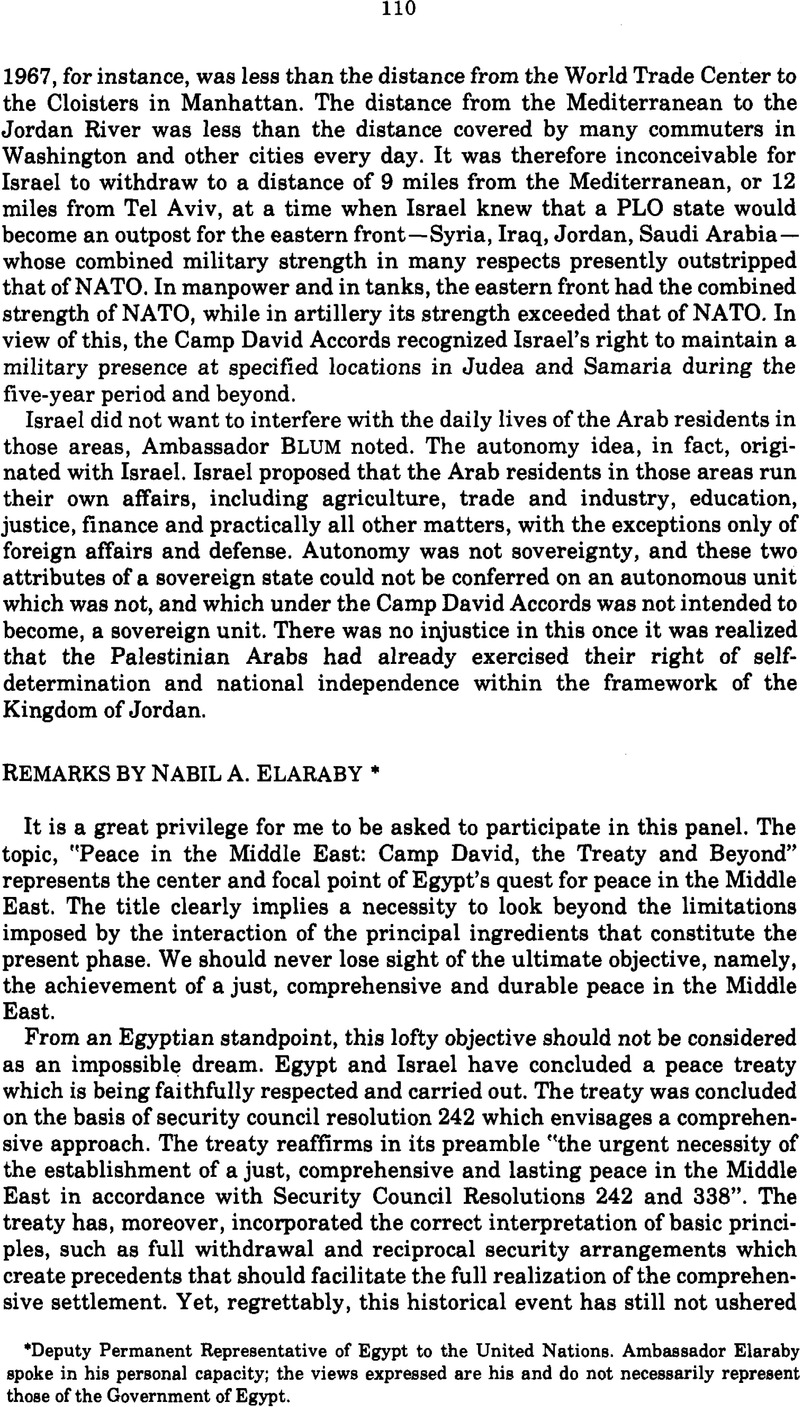Article contents
Remarks by Nabil A. Elaraby
Published online by Cambridge University Press: 28 February 2017
Abstract

Information
- Type
- Peace in the Middle East: Camp David, the Treaty, and Beyond
- Information
- Copyright
- Copyright © American Society of International Law 1980
References
1 It is relevant to recall, however, that the concept of full withdrawal was endorsed by all member states. In the course of the Fifth Emergency Special Session of the General Assembly two draft resolutions were proposed and both called for full Israeli withdrawal. The nonaligned draft (A/L.522/Rev.l) dated June 30, 1967 called upon Israel “immediately to withdraw all its forces to the positions they held prior to 5 June, 1967.” The Latin American draft (A/523/Rev.l) dated July 14,1967 urgently requested Israel “to withdraw all its forces from all the territories occupied by it as a result of the recent conflict.” Neither draft was adopted due to the wide disagreement on the necessity to terminate the state of belligerency. The so-called ambiguity regarding the extent of the withdrawal has been decisively settled in the Peace Treaty. Art. 1 stipulates that the Israeli withdrawal shall be to “the international boundary between Egypt and mandated Palestine.”
2 It should also be recalled that direct negotiations were never required under U.N. resolutions. Security Council Resolution 338 did, however, call for negotiations “under appropriate auspices” with a view to implementing 242 in all its parts.
3 Aide-Memoire submitted by the Special Representative of the Secretary-General on February 8,1971 (S/10403 Annex 1) endorsed by the General Assembly in resolutions 2799 (XXVI) and 2949 (XXVII).
4 Camp David Accords.
5 The scope of Article 22, para. 4 of the Covenant encompassed Palestine.
6 U.N. Charter, Art. 55.
7 Regardless of Israel's numerous attempts to justify its settlement policy the international ! community, without any exception, has consistently condemned the establishment of settle- i ments as an illegal measure and a clear violation of binding international conventions. It is therefore relevant to recall that Art. 49 of the 1949 Geneva Convention relative to the j protection of civilian persons in time of war states: “The Occupying Power shall not deport or transfer parts of its own civilian population into the territory it occupies.”
8 Reference to the Israeli Supreme Court should not entail any recognition of the applicability of Israeli law to the occupied territories.
9 Supreme Court of Israel, ruling of October 22,1979.
10 S/PV 2199 at 56.
11 S/PV 2201 at 47.
12 Camp David Accords.
13 A Framework for Peace.
14 Shmuel Katz, Former Advisor on Information to the Prime Minister in a recent article published in the Jerusalem Post (Int. Edition).
15 New York Times, November 16, 1979. The complete editorial follows:
The West Bank Folly
Israel is turning the offer of "autonomy" to Palestinian Arabs into a sham. Under the cover of a developing peace with Egypt, Prime Minister Begin and his Cabinet seem to be doing their utmost to frustrate the other half of the Camp David accords. They are provoking even moderate West Bank leaders into hostility and binding them to the Palestine Liberation Organization. How the Israelis expect to negotiate with people they seem determined to humiliate is almost beyond understanding.
The domestic political interests of a now feeble Israeli regime are an obvious but insufficient explanation. If this is good politics, the question becomes, why? Do the Israeli people really favor the banishment of the elected Arab mayor of Nablus for thinking impure thoughts? He has been accused of making a private — and provoked — remark to an Israeli general expressing some degree of understanding for the Palestinian guerrillas who killed 34 Israelis in a coastal raid last year. Did not Mr. Begin once play on the hesitant sympathy of Jews for his political terrorism? Do the Israeli people really favor a policy whose only outcome can be the permanent occupation of a million Palestinians condemned to such conflicted emotions?
With one mayor's arrest, the Israelis have now prompted the resignation of the mayors of all 25 cities in the West Bank and Gaza strip, plus general strikes, demonstrations and some violence. They will no doubt settle the argument with a show of military force.
They will then proceed, insensate, to a newly announced policy to double or triple the Jewish population of the West Bank. Although elaborately justified with legal theory, and probably to expensive to bring off, this effort aims to settle a different argument — about West Bank sovereignty — by further assertions of force. The new settlers, it should be noted, would be recruited not because of any military or even "biblical" imperative but to compensate the sponsors of a recent seizure of private Arab lands that Israel's highest court found illegal, in no way justifiable on security grounds.
And when the turmoil subsides, Israel will again ask the world to believe that no Palestinians could be lured into negotiations to receive the promised "autonomy." That has so far, sadly, been true. It will surely remain true so long as such inflamatory policies are pursued. Moshe Dayan recently quit the Begin cabinet with the complaint that it does not understand the Arab mentality. One does not have to be an Arab to perceive such elementary affronts to human nature.
16 Speech at the National Press Club, Washington, D.C., April 10,1980.
- 1
- Cited by

